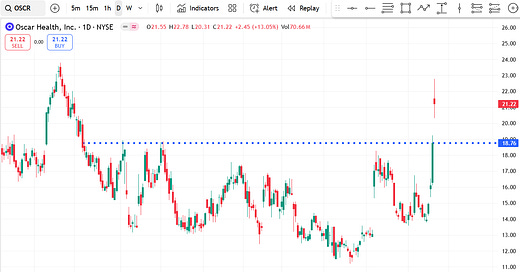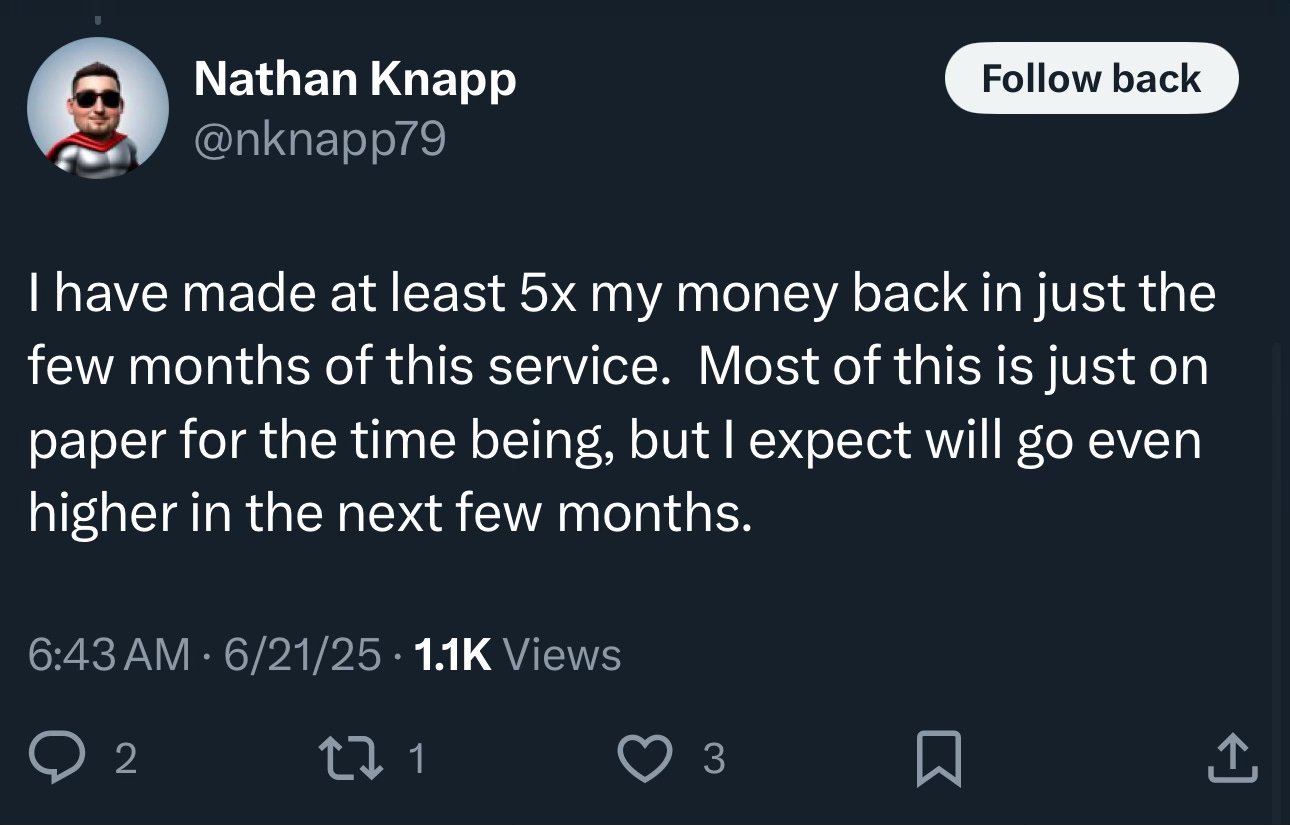The $7 Trillion Healthcare Crisis Has Created a Once-in-a-Decade Investment Opportunity
Healthcare Insurance Is Broken ... This Innovative Company’s AI Might Finally Fix It
$4.9 trillion.
That's what Americans spent on healthcare last year.
More than the entire GDP of Germany.
To put it in perspective, that's roughly $15,000 for every man, woman, and child in the country.
And here's the kicker: we're just getting started.
Government research predict that number will balloon to over $7 trillion by 2031.
So where exactly is all this money going?
And why does it feel like we're getting less healthy despite spending more than any other nation on earth?
Here's the uncomfortable truth most people don't realize:
If you're like most Americans, you're not feeling the full weight of those skyrocketing healthcare costs.
Your employer is probably picking up some of the tab for your health insurance premiums.
But make no mistake—you're still paying for it through smaller paychecks, less raises and fewer benefits.
And if you're a business owner?
You know exactly how brutal these costs have become.
The waste is staggering.
Researchers estimate that between $600 billion and $1.9 trillion of our healthcare spending goes straight down the drain every year.
That's up to $5,700 per person
Potentially two-thirds of your insurance premiums go to admin - not actual care.
But here's what caught my attention:
While the entire industry has been stuck in this expensive quicksand, one company has been quietly using AI to completely reimagine how health insurance should work.
The Harvard Trio That Said "Enough"
Three Harvard Business School graduates got fed up with the same insurance nightmares you've experienced.
Joshua Kushner couldn't decipher his own benefits statement after a leg injury.
Mario Schlosser and his pregnant wife couldn't find a decent doctor without jumping through hoops.
In 2012, they decided to build the insurance company they wished existed:
Oscar Health
Kushner tapped his network of elite investors—including PayPal co-founder Peter Thiel and Google's parent company Alphabet GOOG 0.00%↑ GOOGL 0.00%↑ .
Schlosser assembled a team of Google engineers to build something the industry had never seen: a health insurance platform designed from scratch for the smartphone age.
The result?
While traditional insurers still rely on systems that look like they were coded in the 1990s, Oscar built everything on AI-powered technology that actually works for customers instead of against them.
AI That Actually Helps (Instead of Hiding Behind Phone Trees)
Oscar's AI doesn't just automate the bureaucracy—it cuts through it entirely:
Instant answers instead of endless phone holds
Smart doctor recommendations based on your actual needs
Lightning-fast authorizations for procedures you need
Billing that makes sense (revolutionary concept, I know)
The proof is in the numbers:
Oscar's customer satisfaction score is 66.
That’s more than double the industry average.
When was the last time you heard someone say they loved their health insurance company?
The Turbulence (And How They Turned It Around)
Like most disruptors, Oscar hit some serious turbulence. After going public in 2021 at $39 per share, the stock crashed 95% by 2022 as the company burned through cash building its platform and growing membership.
Wall Street was ready to write Oscar's obituary.
Then came the turnaround.
In March 2023, Oscar brought in Mark Bertolini as CEO.
He was the former head of Aetna, one of the nation's largest insurers.
Suddenly, Oscar had both the tech vision and the insurance expertise to make it work.
The transformation was swift and decisive.
The Breakout Numbers
After trimming the fat in 2023, Oscar came roaring back in 2024:
Revenue jumped 42% to $3 billion in Q1 2025
Membership grew 40% to over 2 million people
Operating efficiency hit record levels—their administrative costs dropped to the lowest in company history
But here's the kicker:
Despite having more than doubled their membership since going public and dramatically improving profitability, Oscar's stock still trades below the 2021 IPO price.
Wall Street analysts are being conservative
But here’s what that really means …
Wall Street analysts are scared of looking foolish again after the 2022 crash.
Earnings forecasts look achievable, maybe even conservative.
The Bottom Line
Healthcare costs aren't going anywhere but up.
The question is whether you'll be stuck with the same inefficient, frustrating system that's been failing Americans for decades.
Or whether you'll benefit from the company that's finally fixing it.
Oscar Health has proven it can grow membership, satisfy customers, and turn a profit.
With 47 AI innovations in development and management expecting 25% membership growth in 2025, this could be the rare opportunity to profit from healthcare disruption before Wall Street fully wakes up.
The stock trades at a fraction of where it was during the IPO hype, but now the fundamentals actually support the vision.
Sometimes the best opportunities come disguised as yesterday's disappointments.
Action to Take Now
Just last week, congressional lawmakers signaled they're keeping Medicare spending intact in the so-called “Big Beautiful Bill”.
But here's the real kicker:
On June 16, several representatives reintroduced the "Choose America Act" …
That’s a bill that would expand Medicare to give ALL Americans the option to get Medicare coverage.
Now, will this bill pass through a Republican-controlled Congress?
Probably not anytime soon.
But Wall Street doesn't trade on certainty—it trades on possibility.
The mere prospect of Medicare expansion sent investors into a frenzy.
Oscar became a trending topic on X over the weekend.
Suddenly, everyone wanted a piece of the AI-powered insurance disruptor.
When a stock jumps 50% in a week, FOMO kicks in hard.
Your brain starts calculating what you "could have made" if you'd bought earlier.
But here's what 20+ years of market experience has taught me:
The risk of chasing hot stocks is far greater than the risk of missing out on the ones that don't pull back.
Smart money waits for the retest.
Look for Oscar to pull back to the $18-19 range (where it broke out of its previous trading pattern).
More conservative investors might even wait for a dip to $16 if we get that lucky.
Yes, you might miss the move if Oscar keeps climbing without looking back.
But over your investing career, you'll make far more money by being patient and buying quality companies at reasonable prices than by chasing momentum.
An Even Greater Opportunity?
Don't get me wrong …
If Oscar executes on its growth plan, this stock could be a major winner over the coming years.
The fundamentals are solid, the market opportunity is massive, and they're years ahead of the competition on AI.
But I'm currently tracking two other small-cap opportunities that could deliver even greater returns than Oscar.
And the best part?
Neither one is trending on social media yet.
My first small-cap recommendation for Equity Empire subscribers doubled in less than three months.
I expect it to climb significantly higher over the next 12-18 months.
Sometimes the biggest opportunities are the ones no one's talking about yet.
If you want access to this pick and the new small cap opportunities I’m currently working on, click the link below to join hundreds of happy Equity Empire subscribers:
Your financial freedom is now within your reach.
Don’t let this opportunity pass you by.
Your personal small cap research analyst,
John McHugh





